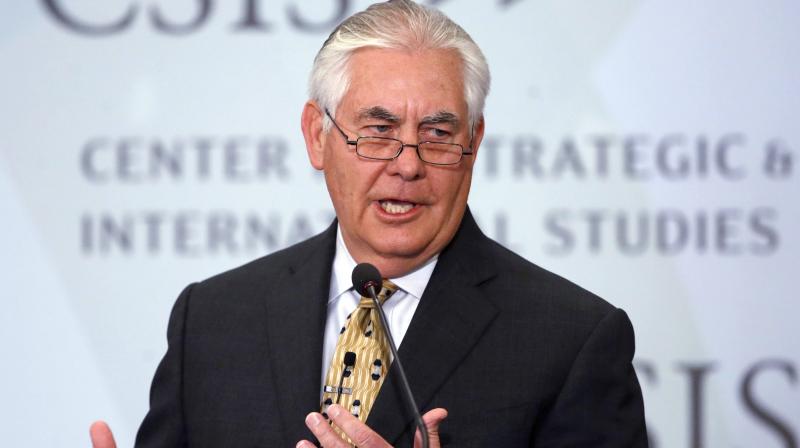US pays close attention to China's OBOR initiative: Tillerson
Trump administration's engagement with China kicked off with the visit of Xi Jinping to the US President's residence in Florida.

Washington: Secretary of State Rex Tillerson Wednesday said the US is paying a close attention to Beijing's 'One Belt, One Road' (OBOR) initiative, but sought to clarify that the Trump administration does not intend to contain China's economic growth.
"It is not our intent to contain China's economic growth. They must grow. They still have hundreds of millions of people that need to move out of poverty. But we do pay close attention to their OBOR policy," Mr Tillerson told the State Department employees in a town hall.
The OBOR strategy articulates the Chinese view of their future of how they're going to grow their economy, and how they're going to protect that economic growth, and perhaps extend some of their own spheres of influence around the world, he noted.
The Secretary of State borrowed a quote from Defence Secretary Jim Mattis: "China has One Belt, One Road; the United States and the global economy has many belts and many roads, and no one country gets to choose the belt or the road."
"It's part of the global order, the international system of rules and norms. China can choose to carry out its OBOR within that system, or it can try to redefine that. And that's what a lot of the discussion between us is about: How are we going to live together? How are both of us going to be prosperous together?" the top US diplomat sought to know.
China, he said, has been cooperating on North Korea, but it needs to do more. "In some respects, it was a good way to start this new administration's relationship with China because it gave us something of a shared objective from the very beginning to pursue. And they were very open to hearing our approach and have been supportive in that regard," he said.
Trump administration's engagement with China kicked off with the visit of President Xi Jinping to the US President's Mar-a-Lago residence in Florida.
Now there are four dialogues with China: Diplomatic and Security Dialogue, economic and trade dialogue, law enforcement and cyber security dialogue, and people-to-people dialogue.
"All four of these high-level dialogues met throughout the year and reported out the status of those discussions and President Trump's recent state visit to Beijing. Our message to the Chinese in these dialogues was these need to be results-based dialogues, not just meet and talk. We have to produce something that moves this relationship forward," Mr Tillerson said.
These dialogues, he said, are serving very important purposes because behind all of these discussions is trying to understand what is going to define the US-China relationship for the next half century.
"How are we going to live together, two great powers with great peoples that need to be - have needs that need to be served? So that's framing much of the China policy in our engagement, and obviously, there are significant national security issues," he said.
The Secretary of State said relationship with China has been pretty well defined since the opening of China with Nixon's historic visit over the past many years with the "One China" policy, the commitment to the three communiques, and it did - it has led to a period of calm, prosperity as China's economy has grown.
"All of us have benefited globally with China's economic growth. But now, a lot of things have kind of gotten out of balance, as you well know," he said.
"The dialogue we're having with the Chinese today is okay, that worked for the last 40 to 50 years, but China is in a different place now. You are in many respects still a developing nation because you have millions of people that are yet to move out of poverty and to middle class status, but you're not the developing China of the Nixon era. You're in a different place today and we're in a different place," he said.
On the South China Sea, Mr Tillerson said it is one area where the two countries hold significant differences and that they have to deal with it.
"China's continued building of these structures in the South China Sea in territories that are disputed - others lay claim to - and then further militarising those structures is a very serious issue that we talk about routinely," he said.
Mr Tillerson noted that the contentious South China Sea issue is "a concern to many of our allies and trading partners in the Southeast Asia region."
"In our view, China has gone too far in this area. So can we achieve some kind of halt? Can we freeze it where it is so we can sort out how we're going to work through this?" he asked.

